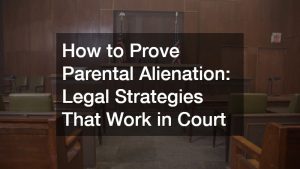When people think of family courts, the first thing that comes to mind is usually divorce proceedings. While this is certainly one type of case that can be heard in a family court, many kinds of cases can be addressed. This article will look at some of the most common types of cases heard in family courts.
Dissolution of Marriage
The family courts handle various cases that touch on the people’s lives within a household. One typical case that family courts hear is the dissolution of marriage, more commonly known as divorce. In a divorce, the court overseeing the case will decide things like child custody and division of assets. Because family courts are often more intimate than other court settings, they can provide divorcing couples with the opportunity to reach a resolution that meets the needs of everyone involved. Additionally, family courts typically have a network of support services available to help couples through the process, making dissolving a marriage less stressful for everyone involved.
Child Custody
Child custody is a topic that family courts address. The child’s parents will be able to agree on who will have custody of the child. If they cannot reach an agreement, the court will decide based on the child’s best interests. There are many factors that the court will consider when deciding on child custody. These factors include the child’s age, relationship with each parent, the parent’s ability to provide for the child’s needs, and the child’s preference. The court will also take into account any history of abuse or neglect. The court’s goal is to decide the best interests of the child.
In some cases, the court may order joint custody, which means that both parents will have legal and physical custody of the child. In other cases, one parent may be awarded sole custody. The parent awarded sole custody will have primary responsibility for making decisions about the child’s welfare. The court will also consider any special needs that the child may have when deciding custody. Hence, if you are in the middle of a divorce and want to get custody of your kid, it’s best to hire a child custody attorney. These attorneys have all the knowledge required to help you get joint or sole custody of the child based on the circumstances. They can put forward all the plus points in front of the judge to get the right judgment. Hence, you need to hire a lawyer for the best custody results.

Property Division
Property division is one of the most challenging and emotional aspects of any divorce. It can be challenging to fair divide all the property and assets that have been acquired during the marriage. In some cases, spouses may be able to agree on their own. However, a family court may need to get involved to reach a fair and equitable solution in other cases. The court will consider various factors when deciding, such as the length of the marriage, each spouse’s earning potential, and whether there are any minor children. Once the court has decided, it will issue an order dividing the property between the two spouses. This may mean that one spouse will receive the family home while the other spouse will receive other assets, such as retirement accounts or investment properties. Ultimately, the goal is to ensure that both spouses can move forward with their lives in a financially stable way.
Alimony
Alimony, also called spousal maintenance, is a sum of the amount paid by one ex-spouse to the other after divorce. Alimony is usually based on need and ability to pay. Its purpose is to help the less financially stable spouse maintain his or her standard of living after a divorce. Family courts will consider various factors when making an alimony decision, such as the length of the marriage, each spouse’s earning capacity, and financial resources. In most cases, alimony is paid for a set time and can be modified if circumstances change, such as remarriage or cohabitation. Once alimony payments have been made, they are typically not subject to change. Suppose you are considering divorce and believe you may be entitled to alimony. In that case, it is essential to speak with an experienced family law attorney to evaluate your case and give you the best legal guidance.
Visitation Rights
The court may also order visitation for the non-custodial parent in some cases. This means that the non-custodial parent will be allowed to spend time with their children even though they do not have custody. The amount of time that the court orders will be based on the children’s best interests.
These are just some of the most common cases heard in family courts. If you have any questions about your specific case, you should speak to an attorney specializing in family law.






